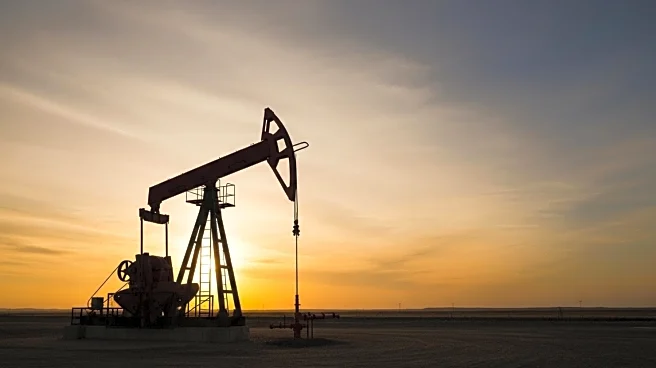What is the story about?
What's Happening?
The International Energy Agency (IEA) has reported an acceleration in the natural decline rates of global oil and gas fields, primarily due to increased reliance on shale and deep offshore resources. This trend necessitates heightened investment efforts by companies to maintain current output levels. The IEA's analysis indicates that without sustained investment in existing fields, the world could lose oil production equivalent to the combined output of Brazil and Norway annually, posing significant challenges to market stability and energy security. The report highlights that nearly 90% of upstream investment is currently directed towards offsetting supply losses at existing fields, rather than meeting new demand. The IEA's findings are based on data from approximately 15,000 oil and gas fields worldwide, revealing average annual post-peak decline rates of 5.6% for conventional oil and 6.8% for conventional natural gas.
Why It's Important?
The increasing decline rates in oil and gas fields underscore the critical need for continued investment in the energy sector to ensure global energy security. This development has significant implications for the U.S. and other industrialized nations that rely on stable energy supplies. The potential loss of production capacity could lead to increased energy prices and heightened competition for resources, affecting industries and consumers alike. The IEA's report also highlights the ongoing tension between traditional fossil fuel investments and the global shift towards clean energy, a point of contention with President Trump's administration. The findings may influence future energy policies and investment strategies, as stakeholders balance the need for energy security with environmental commitments.
What's Next?
The IEA's report may prompt discussions among policymakers and industry leaders regarding the allocation of resources towards maintaining existing oil and gas production versus investing in renewable energy sources. Companies may need to reassess their investment strategies to address the accelerated decline rates and ensure long-term energy security. Additionally, the report could influence international energy policies and agreements, as countries seek to balance economic growth with environmental sustainability. The U.S. government and energy companies may need to consider the implications of these findings in their strategic planning and policy development.















